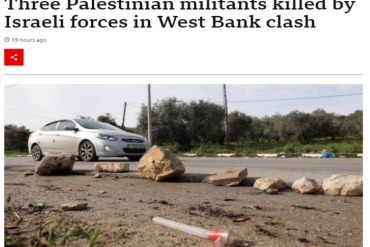A guest post by Gidon Ben-Zvi, who blogs at Jerusalem State of Mind
The Guardian’s Harriet Sherwood recently told a tale of Israeli settlers attacking Palestinian olive groves, ‘Israel urged to protect West Bank olive trees after settler attacks‘, Oct. 15.
To lend credence to what appears to be an alarming trend, Ms Sherwood cites the always handy United Nations, which reported that more than 870 trees were vandalised in the first week of [this year’s] harvest, which began in most places on or after 5 October.
Allegedly, such attacks have increased in recent years. Since the beginning of 2012, a total of 7,180 Palestinian-owned trees have been vandalised by settlers, according to the UN’s office for the co-ordination of humanitarian affairs.
Hanan Ashrawi, a member of the PLO’s executive committee, wasted no time in exploiting the report, charging that settlers were launching attacks under the protection of the Israeli military.

To say that there is not the slightest air of reality surrounding these allegations would be to gloss over a more profound truth: Ms Ashrawi is dutifully perpetuating the Palestinian-Israeli conflict by failing to address Palestinian “…incitement to hate, promotion of an ethos of violence and struggle, and non-development of a culture of peace.”
For while Hanan Ashrawi is frequently presented to the international community as the telegenic, kinder, gentler face of Palestinian politics, it’s important to remember that when Palestinians speak to foreign audiences, they speak quite differently than the way they address their own people.
Sadly, the PA’s decades-long campaign to honor terrorists – presenting them as heroes and role models – has borne fruit.
According to a recent poll conducted by the Palestinian Center for Policy and Survey (PSR), nearly half of all Palestinians (47.5 percent) support terrorist attacks on Israeli civilians inside the 1949 armistice lines.
And while no one can deny that the amount of settler ‘price tag’ attacks have indeed grown in recent years, the overwhelming majority of Israelis deplore them. In stark contrast, the PA, while quick to condemn price tag attacks on West Bank mosques, simultaneously gives its assent to murder and entices future terrorists with assurances of glory and honor.
Sherwood, however, is seemingly enthralled with the Palestinian victim narrative. She evidently holds the Palestinian people and their government in such low regard that Arab violence is perceived as par for the course while Jews behaving badly elicits cries of condemnation that spill over into a questioning of Israel’s moral legitimacy.
Ms Sherwood’s selective fact picking is evident when she cites the UN figure of approximately 10,000 trees in 2012 having been uprooted or vandalized. By whitewashing PA-sanctioned incitement to violence against Israelis in an article whose focus is the deteriorating relationship between Palestinians and Israelis, Ms Sherwood is effectively perpetuating the racist assumption that Palestinians lack moral agency.
For the sake of balance, a few inconvenient truths should be considered at this point.
Jewish residents in the West Bank live in settlements that comprise less than five percent of the West Bank. Furthermore, Israel has started virtually no new communities in the West Bank in years, having withdrawn completely from the Gaza Strip in 2005. The limited new construction in existing settlements that has taken place in recent years has been within pre-existing boundaries. Under the Oslo Accords, Israel turned over control of all the large Palestinian population centers, leaving more than 95 percent of Palestinian Arabs living under their own leadership.
And while Hanan Ashrawi sees IDF footprints in the criminal actions of a few Israeli settlers, the truth is that the Israeli military only reentered PA territory temporarily, during the Second Intifada, in order to protect Israeli citizens by confronting the terrorists at their bases of operation – inside Ms Ashrawi’s beloved Palestinian Authority.
Now, no one can deny that the West Bank is in the midst of an economic crisis. UN figures say that unemployment in the West Bank is 17 percent, a figure that may well under-represent the severity of the crisis, given the large numbers of under-employed in the West Bank. The Palestinian Authority has paid only partial salaries to its 114,000 civil servants in the West Bank, about 15 percent of the local work force, over the past few months because of a shortfall in its $4 billion budget.
Yet, Ms Sherwood does a great disservice to West Bank Palestinians by implying that their deepening impoverishment is due to uprooted olive trees. For it’s the PA that administers services to more than 90 percent of the West Bank Arabs.
West Bank Arabs apparently know something that Ms Sherwood doesn’t about their leadership.
A poll recently published by the Palestinian Center for Policy and Survey Research (PCPSR) revealed that the majority of Palestinian Arabs believe their government is corrupt, that there is no freedom of press under the PA and that Arabs living under Palestinian rule cannot freely criticize the PA without fear of retribution.
Ms Sherwood should channel her moral outrage at the true cause of Palestinian misery – and let the olive trees be.





